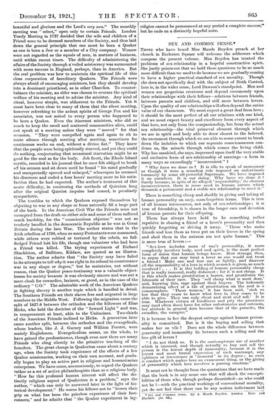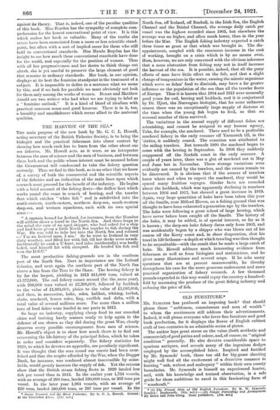SEX AND COMMON SENSE.* Thou who have heard Miss Maude
Roydcn preach at her church in Eccleston Square will welcome tho addresses which compose the present volume. Miss Boyden has treated the problems of sex-relationship in a hopeful constructive spirit. She justly points out that we hold these questions to be so much more difficult than we used to do because we are gradually coming to have a higher practical standard of sex morality. Though she does not specifically deal with the subject of Birth Control, hers is, in the wider sense, Lord Dawson's standpoint. Mon and women are gregarious creatures and depend enormously upon their relationships with their fellows—relations between friends, between parents and children, and still more between lovers. Upon the quality of our relationships will often depend the entire value of our characters. We must expect a great deal from love ; it should be the most perfect of all our relations with our kind, and we must expect beauty and excellence from every aspect of that love, not only from the companionship, but from the actual sex relationship—the vital primeval element through which we are in spirit and body able to draw closest to the beloved, the sacrament through which we are able to some extent to break down the isolation to which our separate consciousnesses con- demn us, the miracle through which comes the living child.
Why has mankind, she says, impressed upon itself the very stable and exclusive form of sex-relationship of marriage—a form in many ways so exceedingly " inconvenient " ?
" Why have we done so It is idlo to speak of monogamy as though it were a senseless rule imposed on unfortunate humanity by some all-powerful. Superman. We have imposed it on ourselves. It is our doing. Why have we done it ? Surely because, in spite of its alleged ' impossibility,' its obvious inconveniences, there is some need in human nature which demands a permanent and a stable sex relationship to meet it."
There is something cheap and shoddy in giving and taking of human personality on easy, soon-forgotten terms. This is true of all human intercourses, not only of sex-relationships ; it is true of friendship, it is shown in the longer care and devotion of human parents for their offspring.
There has always been held to bo something rather repulsive in sharing a friend or a lover's personality and then quickly forgetting or driving it away. " Those who make friends and lose them as trees put on their leaves in the spring and shed them in the autumn are not quite human." This is more true of lovers :-
" Sex-love includes more of one's personality, it more completely involves body, soul and spirit, is the most perfect form of union that human beings know. How strange, then, to argue that one may treat a lover as one would not treat a friend 1 Make one and lose one so lightly, and disavow all the responsibility of a love in which so much is given, so much involved 1 . . . It is this holding of human personality cheap that is really immoral, really dishonest : for it is not cheap. It is this which makes prostitution a horror, and prostitutes the Ishinaels of their race. They ` sell cheap what is most dear,' and, knowing this, rage against their buyers. The hideously demoralizing effect of a life of prostitution on the soul is a commonplace. These women,' it has been said, sink so low that they cease to know what love is, they cease to be
able to give. They can only cheat and steal and sell.' It is true. Whatever virtues of kindliness and pity the prostitute may (and often does) have for other unfortunates and outcasts, her attitude in general does become that of the parasite, the swindler, the vampire."
It is because in her the deepest outrage against human person- ality is committed. But is it the buying and selling that makes her so vile ? Does not the whole difference between generosity and immorality lie between such a selling and the free gift of lovers ?
" I do not think so. It is the contemptuous use of another which is immoral, and though actually to buy and sell the person is the lowest depth of immorality, because it is the lowest and most brutal expression of such contempt, any lightness or irreverence is ' immoral ' in its degree ; so even is conduct which makes love an evanescent thing, or the giving of personality which love involves a passing emotion."
It must not be thought from the quotations that we have made that the book is in any sense one that will shock the suscepti-
bilities of those who, though perhaps dissatisfied—as who could not be ?—with the practical workings of conventional morality, yet do not feel that there can be any serious indictment laid
• Sez and Common Sense. By A. Maude Boyden. London Run and
against its theory. That is, indeed, one of the peculiar qualities of this book. Miss Royden has the sympathy of complete com- prehension for the honest conventional point of view. It is this which makes her book so valuable. Many of the truths she utters have been enunciated from a more or less scientific stand- point, but often with a sort of implied sneer for those who still hold to conventional standards. Miss Maude Royden has the insight to see how much these conventional standards have clone for the world, and especially for the position of women. Thus with all her progressiveness and her desire to think things out afresh, she is yet careful to preserve the large element of good that remains in ordinary standards. Her book, in our opinion, displays at its best the feminine standpoint in the treatment of a subject. It is impossible to define in a sentence what we mean by this, and if we look for parallels we must obviously not look for them only among the works of women. .Renan and Matthew Arnold are two writers who had what we are trying to label as a " feminine outlook." It is a kind of blend of idealism with practical common sense and good humour. There is in it, too, a humility and unselfishness which seems allied to the maternal qualities.



































 Previous page
Previous page